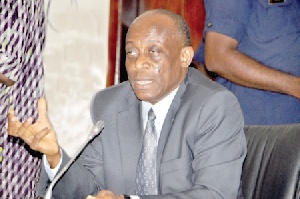Finance Minister Seth Terkper has assured Ghanaians that the nation would soon experience an economic boom following the prudent home-grown policies being put in place by the government.
Mr. Terkper told Business Day the economy would bounce back to become much stronger and resilient, calling on investors to take advantage of the opportunities in the various sectors by partnering the government.
“Many good things would happen to Ghana soon and we will need the cooperation of everybody in the country to achieve this,” the Finance Minister told Business Day on the sidelines of the just-ended 2015 World Bank/ IMF Spring Meeting in Washington DC, USA.
He said the country’s new oilfield, offshore Tweneboa, Enyenra and Ntomme (TEN) project, is expected to deliver its first oil in June 2016 with a production rate of 80,000 barrels of oil per day.
Ghana’s economy has been going through some economic turbulence since June last year. However, the situation seems to have gotten worse since the beginning of this year. Government’s expenditure has been a thorny issue in the fiscal struggles that the country faces. Expenditure on wages and salaries from January to May 2014 stood at GH¢3.8 million, higher than the budget target of GH¢3.7 million.
Many Ghanaians could not fathom why a government that had been blessed with so much revenue, in the form of high taxes, oil revenues, unprecedented loans, good export prices and foreign remittances, could be saddled with an unprecedented debt-to-GDP ratio of almost 70 per cent, depreciating currency, rising inflation, arrears in statutory payments, imminent collapse of the NHIS and other social intervention policies and now left with no option than a resort to the IMF for financial bail-out.
However, the Finance Minister said: “the economy would have collapsed by now if government did not put in place good measures to manage it well. Ghanaians need to give credit to the government for managing the shock.”
Mr. Terkper assured the business community and investors that the government’s three-year programme with the IMF worth over $900 million, will put the economy on the right track for accelerated growth in the medium to long term.
He said in addition to the financial assistance, the programme would offer technical support aimed at restructuring the economy for businesses to succeed.
Since last week, the Finance Minister has been leading a team of government and transaction advisers to have a series of investor meetings to woo potential investors to subscribe the one billion dollar Eurobonds to support Ghana’s development agenda.
In London and New York, Mr Terkper and his team met investors and highlighted the significant progress made by Ghana over the last couple of years and the new prospects created in the Ghanaian economy.
“This finance will not necessarily increase the public debt but will reduce the cost of debt service so we are not borrowing for consumption purposes. The one billion is not going to be for consumption purposes but to support our growing infrastructural needs,” he stressed.
The projected decline in oil and gold prices would also impact negatively on the fiscal framework through lower revenues from oil exports whilst at the same time dampening the effect of foreign exchange pressures arising out of oil lower import bill”.
The Finance Minister however said: “measures are being put in place to reduce our vulnerability to external shocks through such means as strengthening our tools for risk management, diversifying and adding value to our exports, and supporting local production of imported goods which can be produced domestically.”
He continued: “Government would use the oil stabilization fund to manage the volatility of the Cedi.”
General News of Monday, 27 April 2015
Source: Business Day
Ghanaians to smile soon - Terkper assures
Entertainment
















